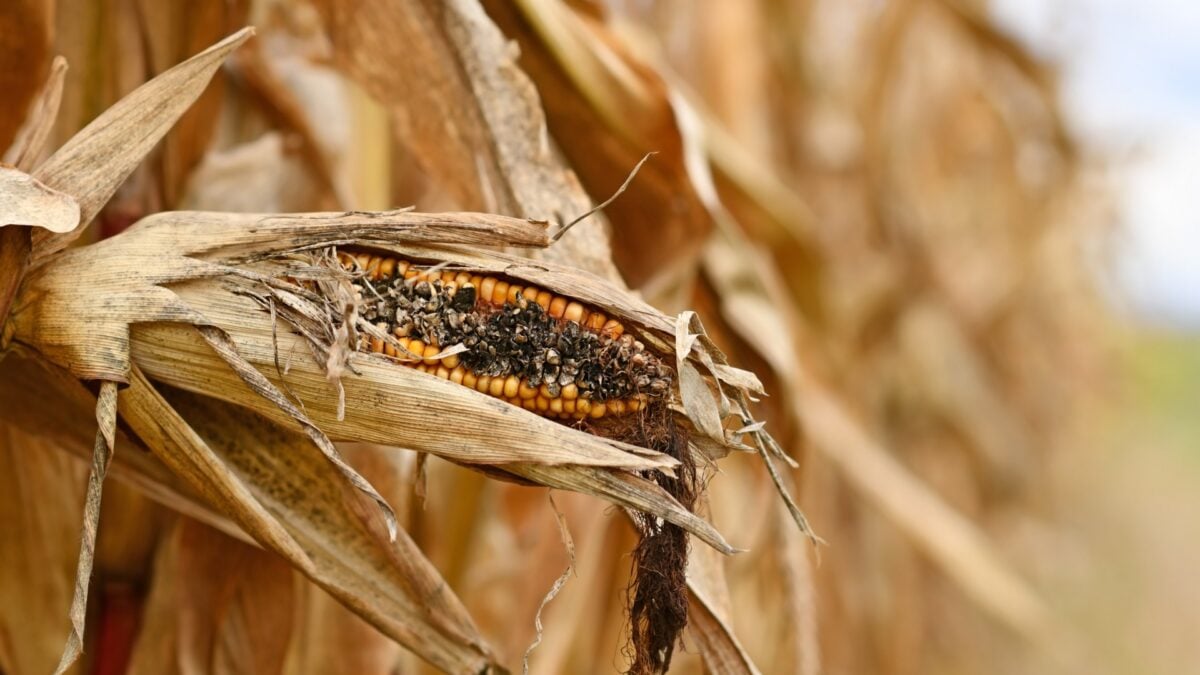Despite happening (thankfully) just once in real life, nuclear warfare has long been a staple element of science fiction. Popular depictions of nuclear conflict—from biographic thrillers like Oppenheimer to imagined disasters like The Day After—reflect the understanding that its consequences would be irreversible and catastrophic to modern society.
Unsurprisingly, nuclear warfare and its potential repercussions concern scientists as much as fiction writers. In a recent paper published in Environmental Research Letters, researchers at Pennsylvania State University examined how nuclear war might disrupt food security worldwide, focusing specifically on the global production of corn, the most produced grain crop in the world. In the worst-case scenario, nuclear weapons would wreak havoc on our atmospheric systems, gradually cutting our annual corn production by up to 87%, the study warns.
For their simulations, the authors considered 38,572 locations for corn production across six different nuclear war scenarios of increasing severity. The simulations took place under nuclear winter conditions, a hypothetical climate scenario following a large-scale nuclear war. During nuclear winters, black carbon from fires triggered by nuclear detonations would fill up the sky, obstructing sunlight. The resulting drop in global temperatures could last for over a decade—long enough to decimate agricultural systems worldwide, according to the scientists.
In addition to black carbon, the authors examined the potential UV-B radiation exposure to plants. The Earth’s ozone usually blocks this type of radiation, but this protective layer would be weakened in the wake of nuclear war. As UV-B radiation causes DNA damage and obstructs plant photosynthesis, the researchers modeled how overexposure to this energy source could affect the soil-plant-atmosphere system that drives crop growth.
The results were disturbing. First, the “best-case scenario,” a regional nuclear war, would release enough soot into the atmosphere to reduce annual corn production by 7%—which, to be clear, would severely impact the global food system, study lead author and meteorologist Yuning Shi explained in a press release. A global-scale war, on the other hand, would inject a massive 165 million tons of soot into the atmosphere, curbing global corn production by a whopping 80%.
That wasn’t all; radiation damage “would peak in years 8 and 9” following the initial detonation of the bomb, causing an additional 7% decrease in corn yields, according to the paper. “The blast and fireball of atomic explosions produce nitrogen oxides in the stratosphere,” Shi explained. This, in combination with heat-absorbing soot, injects a fiery cycle into the atmosphere that “rapidly [destroys] ozone, increasing UV-B radiation levels at the Earth’s surface.”
Thankfully, these are just simulations. They nevertheless “force us to realize the fragility of the biosphere—the totality of all living things and how they interact with one another and the environment,” Shi said. What’s more, the study acts as an early precursor to a more refined, effective response plan for potential disasters, he added.
Hopefully, that disaster won’t be nuclear—though it could be something like a volcanic eruption, which obstructs sunlight in a similar way and is something we can better prepare for. For example, the paper recommended preparing “agricultural resilience kits” containing seeds for crops that can grow under cooler conditions.
“These kits would help sustain food production during the unstable years following a nuclear war, while supply chains and infrastructure recover,” said Armen Kemanian, an environmental systems expert and paper senior author, in the same release. But these kits could easily assist food security in areas affected by severe volcanic activity, he added.
Natural disasters are beyond our control, save for the preparatory part. A self-inflicted environmental catastrophe and global-scale famine—that’s clearly another story. When it comes to nuclear winter, the “best approach to preventing its devastating effects is to avoid it,” the scientists wrote.
